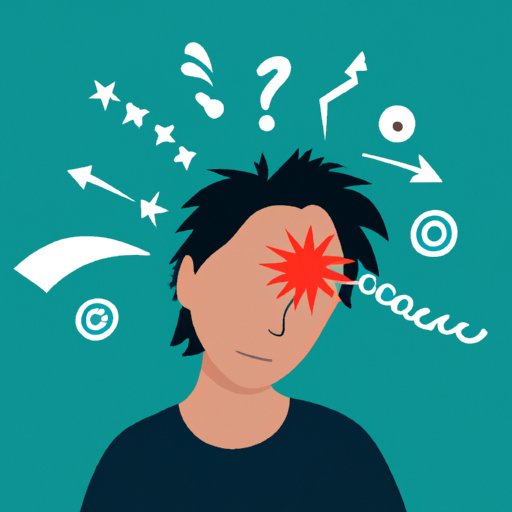
Introduction
Depression and physical pain are two issues that are often discussed separately but are intimately connected. While depression is typically thought of as a mental health issue, it’s important to recognize that it can also have serious physical impacts. This article will explore the link between depression and physical pain, examining the science behind the mind-body connection, and offering support and solutions for those who are struggling.
The relationship between depression and physical pain is one that affects millions of people worldwide. Understanding this connection is essential, as it can help to identify depression earlier and encourage those who are experiencing physical pain to seek the appropriate help. Overall, this article aims to inform, educate, and empower individuals who may be dealing with these issues.
The Surprising Link Between Depression and Physical Pain
Research studies show that people with depression are more likely to experience physical pain. According to the World Health Organization, roughly 50% of people with depression also report physical symptoms, such as headaches, back pain, and gastrointestinal issues.
Patients with chronic pain are also more likely to be depressed, leading to a vicious cycle that can significantly impact an individual’s quality of life. The medical community recognizes the relation between physical pain and depression, and doctors often screen for depression when treating chronic pain conditions.
How Depression Affects Your Body – Breaking Down the Science
Depression can affect your body in many different ways. Stress, anxiety, and depression can exacerbate inflammation, leading to pain and discomfort. Additionally, chemicals within the brain, such as serotonin and dopamine, have an impact on both mood and physical sensations.
Nerve sensitivity is another potential mechanism behind depression-related pain. Hyperactivity in the nervous system can make individuals more susceptible to pain, such as in the case of fibromyalgia.
Overall, the field of psychoneuroimmunology (PNI) is revealing many complex connections between the mind and body, underscoring the need for a holistic approach when it comes to health and well-being.
Understanding the Mind-Body Connection: Learn How Depression Causes Physical Pain
The mind-body connection refers to the idea that thoughts, emotions, and physical sensations are interrelated. When it comes to depression, the psychological distress can manifest as physical pain. When left untreated, depression can leave a person feeling helpless and hopeless, causing the body to react with physical symptoms.
In many cases, people with depression will visit multiple doctors and specialists in search of a solution for their physical pain. Without understanding the connection between mental and physical health, these individuals may continue to suffer without being properly diagnosed or receiving effective treatment.
The Double Whammy: How Depression and Chronic Pain Feed Each Other
The co-occurrence of depression and chronic pain can create a vicious cycle, each condition exacerbating the other. The pain can affect mood, leading to negative thoughts and emotions, further exacerbating physical pain.
Treatment options for both depression and chronic pain are available, and seeking help is crucial to breaking this cycle. Addressing the underlying causes of both conditions and seeking appropriate treatment can help to improve overall wellbeing and quality of life.
Suffering in Silence: Why It’s So Hard to Talk About Depression and Physical Pain
Despite being common issues, depression and physical pain remain stigmatized. The cultural expectation that individuals should always be healthy and happy can make it challenging for someone to admit that they’re struggling.
Furthermore, depression and physical pain can be difficult to articulate, making it hard for friends, family, or doctors to understand what’s happening. In some cases, those experiencing these issues may feel alone, and unsupported, leading to further negative emotions.
It is crucial for individuals to be their own advocates, seeking help, and support when they need it. This might mean seeking help from a therapist, support group, or trusted friend.
From Yoga to Medication: Strategies for Managing Depression-Related Pain
Thankfully, there are many different strategies for managing depression-related pain. Lifestyle changes, such as exercise and nutrition, can help to boost mood and reduce inflammation, leading to less physical discomfort.
Therapy, including cognitive-behavioral therapy, can help to identify negative thought patterns and replace them with more positive, accurate ones. Medications, such as antidepressants, can also be effective in treating depression and reducing physical pain.
Alternative treatments like acupuncture, massage, or yoga, can be great complementary therapies, helping to manage both the physical and emotional symptoms of depression.
Debunking the Myth: Why Saying “It’s All In Your Head” is Harmful to People with Depression
Cultural stereotypes present depression-related physical pain as imaginary or exaggerated, making it challenging for those who are suffering to receive proper treatment. However, there are real biological mechanisms that underlie this relationship. By invalidating the experience of those with depression, individuals could unknowingly be causing more harm.
It is essential to validate the experiences of those who are struggling and encourage them to seek help. The support of friends, family, and medical professionals can be vital in the healing process.
Conclusion
Depression-related physical pain is a complex and often misunderstood issue. This article has attempted to highlight the very real links between mental and physical health, and the importance of seeking proper diagnosis and treatment for both. Remember that you are not alone in your struggles and that there are many resources available for help and support. Don’t be afraid to be your own advocate and take steps towards your own health and wellbeing.





